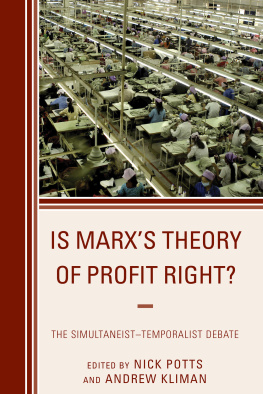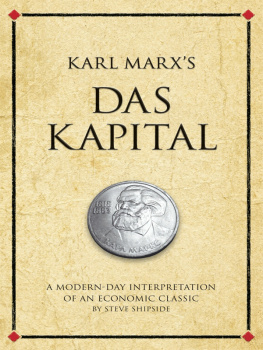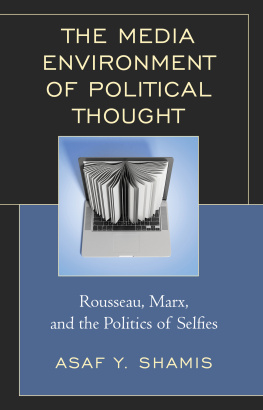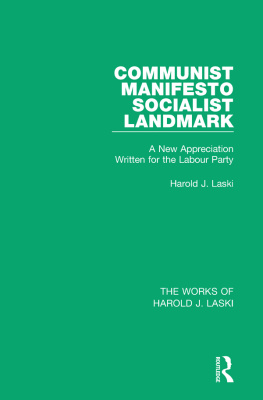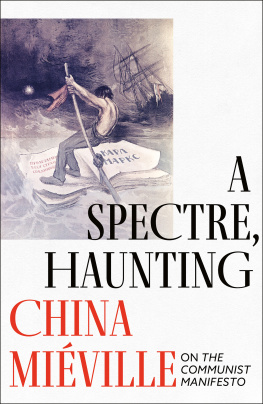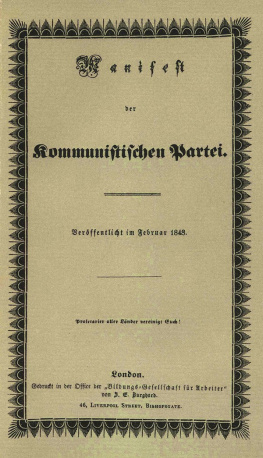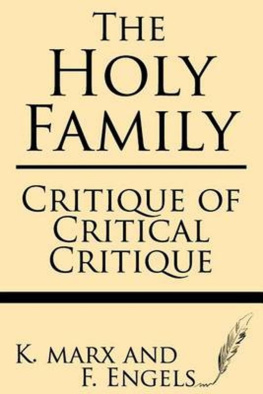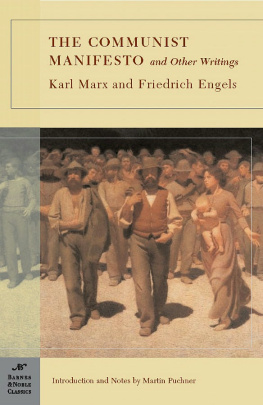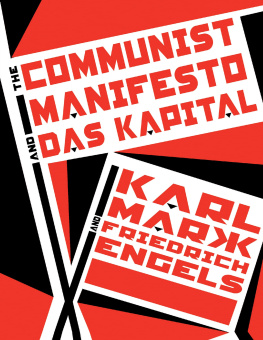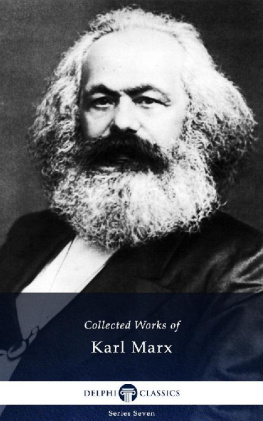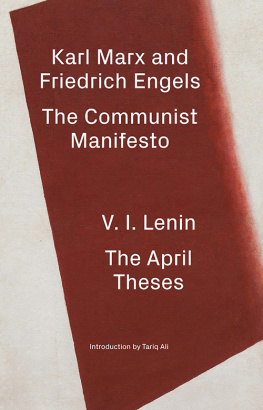Isaacs brilliant introduction and the insightful interpretations by contemporary political thinkers make a convincing case for the continued relevance of the Manifesto for our age of globalization. Two thumbs up!Manfred B. Steger, author of The Rise of the Global Imaginary
By reminding us of the Manifestos democratic urgency, Jeffrey Isaac rips Marx and Engelss masterpiece out of its scholarly retirement and restores it to its rightful place at the centre of our political understanding.Marc Stears, author of Demanding Democracy: American Radicals in Search of a New Politics
A first-rate new edition of the Communist Manifesto, perfect for the Rethinking the Western Tradition series and for these times. Isaacs superb opening essay belongs in the pantheon of great introductions to classic works of political theory, and the other contributions, which are excellent, have been thoughtfully commissioned to demonstrate the continuing vitality of the text.Elisabeth Ellis, author of Provisional Politics: Kantian Arguments in Policy Context
A valuable edition. Its incorporation of four high-caliber interpretational essays alongside all of Marx and Engelss various prefaces to the Communist Manifesto should raise the level of scholarly debate.Paul Thomas, author of Karl Marx and the Anarchists
The Communist Manifesto remains one of the most influential political texts ever writtenbut also one of the most controversial. Just when it seemed safe to consign Marxs ideas to the historical dustbin, globalizations savage inequalities arose to render his insights more relevant than ever. The pathbreaking essays assembled by Jeffrey Isaac in the present volume do justice to both sides of the equation, portraying Marxisms cogency as well as its undeniable political hazards.Richard Wolin, author of The Wind from the East: French Intellectuals, the Cultural Revolution, and the Legacy of the 1960s
The Manifesto is part of modernitys literary canon, but the nuanced brilliance and diverse elaborations of this volumes commentaries make this collection critical reading for those who engage our alternative futures.Michael D. Kennedy, author of Cultural Formations of Postcommunism: Emancipation, Transition, Nation and War
Rethinking the Western Tradition
The volumes in this series
seek to address the present debate
over the Western tradition
by reprinting key works of
that tradition along with essays
that evaluate each text from
different perspectives.
EDITORIAL
COMMITTEE FOR
Rethinking the Western Tradition
David Bromwich
Yale University
Gerald Graff
University of Illinois at Chicago
Gary Saul Morson
Northwestern University
Ian Shapiro
Yale University
Steven B. Smith
Yale University
The Communist Manifesto
KARL MARX
and
FRIEDRICH ENGELS
Edited and with an Introduction by
Jeffrey C. Isaac
with essays by
Steven Lukes
Stephen Eric Bronner
Vladimir Tismaneanu
Saskia Sassen

Copyright 2012 by Yale University.
All rights reserved.
This book may not be reproduced, in whole or in part, including illustrations, in any form (beyond that copying permitted by Sections 107 and 108 of the U.S. Copyright Law and except by reviewers for the public press), without written permission from the publishers.
Yale University Press books may be purchased in quantity for educational, business, or promotional use. For information, please e-mail sales.press@yale.edu (U.S. office) or sales@yaleup.co.uk (U.K. office).
Set in Times Roman type by Keystone Typesetting, Inc.
Printed in the United States of America.
Library of Congress Cataloging-in-Publication Data Marx, Karl, 18181883. [Manifest der Kommunistischen Partei. English]
The Communist manifesto / Karl Marx and Friedrich Engels; edited and with an introduction by Jeffrey C. Isaac; with essays by Steven Lukes... [et al.].
p. cm. (Rethinking the Western tradition)
Includes bibliographical references and index.
ISBN 978-0-300-12302-9 (pbk. : alk. paper)
ISBN 978-0-300-12301-2 (cloth: alk. paper)
1. Communism. 2. Marx, Karl, 18181883. Manifest der Kommunistischen Partei.
I. Engels, Friedrich, 18201895. II. Isaac, Jeffrey C., 1957
III. Lukes, Steven. IV. Title.
HX39.5.A5213 2012
335.422dc23
2011045266
A catalogue record for this book is available from the British Library.
This paper meets the requirements of ANSI/NISO Z39.48-1992
(Permanence of Paper).
10 9 8 7 6 5 4 3 2 1
Contributors
Stephen Eric Bronner is professor (II) of political science, comparative literature, and German studies at Rutgers University, New Brunswick, New Jersey.
Jeffrey C. Isaac is James H. Rudy Professor of Political Science at Indiana University, Bloomington, and editor in chief of Perspectives on Politics.
Steven Lukes is professor of politics and sociology at New York University.
Saskia Sassen is Robert S. Lynd Professor of Sociology at Columbia University.
Vladimir Tismaneanu is professor of government and politics at University of Maryland, College Park.
For Ray and Peter, who first kindled my interested in Marx,
and for Margot, who rekindled it, and much else
What has happened has happened. The water
You once poured into the wine cannot be
Drained off again, but
Everything changes. You can make
A fresh start with your final breath.
BERTOLT BRECHT, Everything Changes
Contents
Acknowledgments
This volume has been a long time coming. It was conceived years ago during a casual conversation with Keith Condon, who was then editing the Rethinking series for Yale University Press. Keith asked me if I might be interested in editing a volume in the series. Seriously overcommitted I was then serving as department chair, directing a university initiative, and also serving as book review editor of Perspectives on PoliticsI responded by asking, How about the Communist Manifesto?thinking that for sure this volume had already been commissioned and I could be on my way. I was wrong. Thus began this book, which has experienced two editors, numerous reviews and revisions, and a substantial time lag separating conception and completionall of which, I think, have contributed to the quality of the product.
A number of colleagues deserve thanks for their support during this process. When the volume was first commissioned, I decided to organize a conference on the volume at Indiana University. I would like to thank Kumble Subbaswamy, then dean of the College of Arts and Sciences (and now provost of University of Kentucky), and Andrea Cicciarelli, director of the College Arts and Humanities Institute, for their support of the conference. I would also like to thank several terrific Indiana colleagues who served as discussants of the conference papers, which became chapters in the current volume: Maria Bucur, Aurelian Craiutu, Milton Fisk, Jeff Gould, Bob Ivie, and Bill Scheuerman. Equally indispensible were a number of colleagues who, as graduate students, helped with conference logistics, especially Melanie Loehwing, Luke Mergner, Margot Morgan, James Moskowitz, and Brian Shoup. The Indiana conference and the follow-up panel at the American Political Science Association meeting were very important to the development of the book.
I would also like to thank the volumes contributors, each a distinguished scholar who went far beyond the call of duty in responding to the needs of the project: Stephen Eric Bronner, Steven Lukes, Saskia Sassen, and Vladimir Tismaneanu. Through Vladimir I have come over the years to know and count as friends several prominent East European intellectuals, and while they played no direct role in the volume itself, their substantial intellectual and political achievements, and their conversation, surely contributed to my approach to the project. I would thus like to acknowledge Miklos Haraszti, Adam Michnik, and Martin Palous for their wisdom and friendship. I would also like to thank my Romanian colleagues at the School of National Political Science and Public Administration in Bucharest, and especially my dear friend Mihaela Miroiu, for their hospitality and insight over the years. I would like to thank as well a group of extraordinary teachers with whom I was lucky enough to study in my youth, and from whom I learned more than I possibly could say: Bob Dahl, Mike Harrington, Mike Krasner, Lennie Markovitz, Sol Resnick, Frank Warren, Mike Wreszin, and especially Ray Franklin and Peter Manicas, with whom I long ago spent hours on end talking about Marx and Marxism.
Next page

